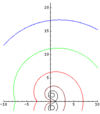Mathematica: Difference between revisions
imported>Meg Taylor (delete redundant categories) |
mNo edit summary |
||
| Line 3: | Line 3: | ||
'''Mathematica''' is a commercial [[computer algebra system]] with own programming language that supports functional and procedural programming styles. It was originally conceived by [[Stephen Wolfram]] and is developed by the [[Wolfram Research]]. It provides cross-platform support for symbolic computation with a large set of tools for numerical calculations, arbitrary precision arithmetic, data processing, plotting (see Fig.1 and its source) and the [[Matlink]] toolbox for interfacing external programs. | '''Mathematica''' is a commercial [[computer algebra system]] with own programming language that supports functional and procedural programming styles. It was originally conceived by [[Stephen Wolfram]] and is developed by the [[Wolfram Research]]. It provides cross-platform support for symbolic computation with a large set of tools for numerical calculations, arbitrary precision arithmetic, data processing, plotting (see Fig.1 and its source) and the [[Matlink]] toolbox for interfacing external programs. | ||
Mathematica programs and data are stored in standard Mathematica files called ''notebooks''. Data in notebooks are organized in cells, which can be arbitrarily nested. A free viewer for Mathematica files (notebooks) called ''Mathematica Player'' is available at the [[Wolfram Research]] web page. | Mathematica programs and data are stored in standard Mathematica files called ''notebooks''. Data in notebooks are organized in cells, which can be arbitrarily nested. A free viewer for Mathematica files (notebooks) called ''Mathematica Player'' is available at the [[Wolfram Research]] web page.[[Category:Suggestion Bot Tag]] | ||
Latest revision as of 16:00, 16 September 2024

Mathematica is a commercial computer algebra system with own programming language that supports functional and procedural programming styles. It was originally conceived by Stephen Wolfram and is developed by the Wolfram Research. It provides cross-platform support for symbolic computation with a large set of tools for numerical calculations, arbitrary precision arithmetic, data processing, plotting (see Fig.1 and its source) and the Matlink toolbox for interfacing external programs.
Mathematica programs and data are stored in standard Mathematica files called notebooks. Data in notebooks are organized in cells, which can be arbitrarily nested. A free viewer for Mathematica files (notebooks) called Mathematica Player is available at the Wolfram Research web page.